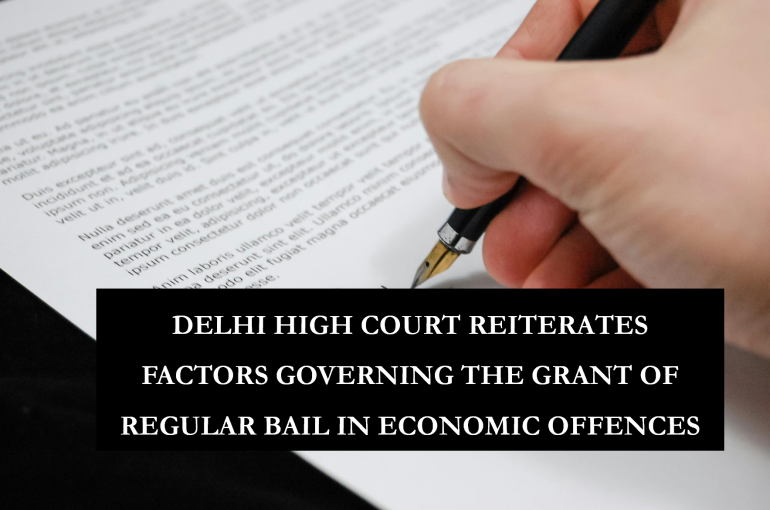DELHI HIGH COURT REITERATES FACTORS GOVERNING THE GRANT OF REGULAR BAIL IN ECONOMIC OFFENCES
INTRODUCTION
A Single-Judge Bench of Hon’ble Delhi High Court comprising of Hon’ble Ms. Justice Swarna Kanta Sharma passed a judgement dated 04.06.2024 in Amandeep Singh Dhall v. CBI, BAIL APPLN. 2229/2023 and reiterated the principles and factors set by the Hon’ble Supreme Court to be considered while granting regular bail, especially in economic offences.
FACTS
The present Bail Application under Section 439 of the Code of Criminal Procedure, 1973 (‘CrPC’) (“Special powers of High Court or Court of Session regarding bail”) was filed by the Applicant, Amandeep Singh Dhall in the case filed by the CBI against the Applicant for offences punishable under Section 120B of the Indian Penal Code, 1860 (‘IPC’) (“Punishment for Criminal Conspiracy”) read with Section 447A of IPC (“Falsification of Accounts”) and Section 7 of the Prevention of Corruption Act, 1988 (‘PC’) (“Offence relating to public servant being bribed”). The Applicant was accused of engaging in a criminal conspiracy to intentionally tamper, create and leave loopholes in the Delhi Excise Policy for 2021-22.
i) The Applicant owned an L-1 Licensee Company and was accused of arranging the recoupment of bribes/kickbacks by issuing additional credit notes through his Company.
ii) The Applicant was also accused of possessing confidential Government documents allegedly for formulating and manipulating the said Excise Policy.
iii) An additional FIR was filed against the Applicant and his father while he was in custody, for bribing the Assistant Director of the Directorate of Enforcement (ED) with Rs. 5 Crores to remove his name from the FIR in respect of which the present Application was related to.
The Applicant denied all the allegations made in the FIR. Previously, he went before the Apex Court asking for the preponement of the date of hearing of the Bail Application before this Bench, citing that his incarceration had been prolonged due to non-hearing his regular bail application by this bench on over 40 occasions. The Apex Court ordered the said preponement. Therefore, the Applicant appeared before the High Court.
ISSUES
The issues before the Hon’ble Court were –
I) Whether there was a delay in deciding the present bail application by this Court?
II) Whether the Applicant made a case for a grant of bail?
ANALYSIS AND JUDGMENT
1) Concerning the first issue, the Court observed the following:
The Hon’ble Bench looked at all the previous dates that had been listed for the hearing of the Applicant’s Regular Bail. It concluded that on about 29 out of the total 37 hearings, it was the Applicant himself who moved multiple interim applications that required urgent attention, such as seeking issuance of notice, interim bail, medical treatment, change of hospital, etc. Therefore, the Court couldn’t possibly be blamed for entertaining the Applicant’s prayers for interim reliefs on multiple occasions.
2) The Court rejected the regular bail in the present case, citing the following reasons:
The Court reiterated the principles governing the grant of bail under Section 439 of the CrPC. It referred to the Apex Court’s judgments of Prasanta Kumar Sarkar v. Ashis Chatterjee (2010) 14 SCC 496 and Nimmagadda Prasad v. CBI (2013) 7 SCC 466, stating that several factors have to be considered while granting bail, such as the presence of a prima facie case against the accused, nature and gravity of the accusation, the severity of the punishment, the possibility of accused fleeing if released on bail, the likelihood of repeating the offence, influence on witnesses and many more.
The Court also relied on Y.S. Jagan Mohan Reddy v. CBI (2013) 7 SCC 439, where the Hon’ble Supreme Court noted that economic offences constitute a distinct category and the severity of such offences must be considered while deciding bail applications.
3) Heavy reliance was placed on the triple test for the grant of bail, which is as follows:
a) Whether the accused is at a flight risk?
b) Whether the accused can tamper with evidence if release on bail?
c) Whether the accused can influence witnesses if released on bail?
4) The Hon’ble Bench weighed in on the latter two issues, explicitly stating that the presence of confidential Government documents with the Applicant, which he could not have obtained legally, highlights his involvement in the entire conspiracy. The Court found that there was a prima facie case against the Applicant supported by the statements of witnesses and documentary evidence.
5) Further, the act of bribing an ED officer, the investigative agency of the case, led the Court to believe that there was well-founded apprehension of the Applicant being able to influence the witnesses and tamper with the evidence. This was supported by the fact that most of the witnesses are well-known to the Applicant, and he is known to be in contact with influential political figures in Delhi.
6) Therefore, the Court held that the triple test for grant of Bail was not satisfied in the present case.
CONCLUSION
The Hon’ble Court rightly considered all the facts revealed in due course of investigation in this case, along with the witness statements and presence of incriminating documents, which added to the seriousness of the allegations and the evidence collected by the Prosecution. The Applicant’s attempt to bribe the investigating agency further added to the gravity of the offence. The Court rightly noted the severe nature of economic offences and their impact on society and the common man while upholding the principles of granting bail as set by the Hon’ble Apex Court. As a result, the High Court denied grant of bail to the Applicant in the present case.
Himangi Nagar
5th year
Symbiosis Law School, Hyderabad
Intern
The Indian Lawyer & Allied Services
Edited by
Harini Daliparthy
Lead Senior Associate
The Indian Lawyer





































Leave a Reply